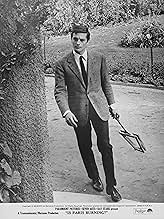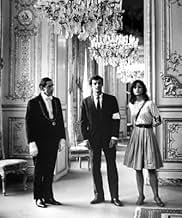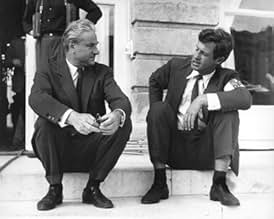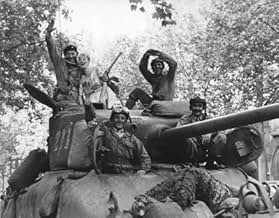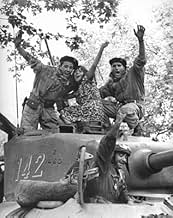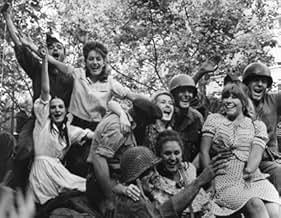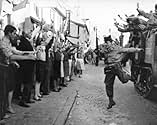PUNTUACIÓN EN IMDb
6,8/10
5,4 mil
TU PUNTUACIÓN
La salida del ejército alemán de París en 1944.La salida del ejército alemán de París en 1944.La salida del ejército alemán de París en 1944.
- Dirección
- Guión
- Reparto principal
- Nominado para 2 premios Óscar
- 4 nominaciones en total
George Chakiris
- GI in Tank
- (as Georges Chakiris)
Gert Fröbe
- General Dietrich von Choltitz
- (as Gert Froebe)
Reseñas destacadas
About 350 years earlier Henry of Navarre had captured just about all of France, but Paris and had been ruling as Henry IV for about five years but he decided he wasn't really king without his capital. He converted to the Catholic religion and Paris became united with the rest of the country. Henry decided that Paris was indeed worth a mass.
Fast forward to 1944. Maybe militarily Paris wasn't worth that much in defeating Hitler, but for the morale of a people being liberated from a brutal conqueror it was invaluable. When the forces of the Resistance in its many branches could no longer be contained with Allied armies only days from Paris, battle plans got changed and a Free French Division under General Phillippe Leclerc went in and helped the Resistance take the city.
Paris brule-t-il is the French cinema's answer to The Longest Day. It is dotted with cameos from French, German, and American film players and makes very effective use of newsreel footage blended into the finished product. You really do think you are watching an actual filmed record of the events as they happened.
The lead in this film is German actor Gert Frobe, better known to audiences as James Bond nemesis Goldfinger. The film opens with him being given command of the city by Hitler himself and given very specific orders to destroy the city before it was recaptured.
Frobe knows it and finally admits that the war is lost. He's concerned about what history will think of him should he do this terrible thing. He gets a direct order from Hannes Messemer playing Alfred Jodl and a reminder of what Hitler does to those who disobey him. Frobe's character General Von Choltitz died shortly after this film debuted and Jodl was executed after being tried at Nuremberg.
Jean-Paul Belmondo, Alain Delon, Jean-Pierre Cassel, Yves Montand are all playing roles of Resistance members. Leslie Caron has a poignant small part as a woman trying unsuccessfully to get her husband freed before the Nazis ship him off to Germany before retreating.
Americans in this film are Kirk Douglas as General Patton, Glenn Ford, as General Bradley and Robert Stack as General Siebert. Those three were put in briefly to insure some American box office in a French story. Funny no one thought of Douglas for the Patton biographical film classic four years later.
Orson Welles has a much bigger part as the Swedish consul general in Paris who negotiates between the Nazis and the Resistance before the Free French Division arrives. Another one of those brilliantly executed parts by Welles he did to get money for his own projects.
Director Rene Clement really made the people of Paris the star of this film. It is their tribute picture and a terrible reminder to people in every nation what it is like to live under a tyranny.
Fast forward to 1944. Maybe militarily Paris wasn't worth that much in defeating Hitler, but for the morale of a people being liberated from a brutal conqueror it was invaluable. When the forces of the Resistance in its many branches could no longer be contained with Allied armies only days from Paris, battle plans got changed and a Free French Division under General Phillippe Leclerc went in and helped the Resistance take the city.
Paris brule-t-il is the French cinema's answer to The Longest Day. It is dotted with cameos from French, German, and American film players and makes very effective use of newsreel footage blended into the finished product. You really do think you are watching an actual filmed record of the events as they happened.
The lead in this film is German actor Gert Frobe, better known to audiences as James Bond nemesis Goldfinger. The film opens with him being given command of the city by Hitler himself and given very specific orders to destroy the city before it was recaptured.
Frobe knows it and finally admits that the war is lost. He's concerned about what history will think of him should he do this terrible thing. He gets a direct order from Hannes Messemer playing Alfred Jodl and a reminder of what Hitler does to those who disobey him. Frobe's character General Von Choltitz died shortly after this film debuted and Jodl was executed after being tried at Nuremberg.
Jean-Paul Belmondo, Alain Delon, Jean-Pierre Cassel, Yves Montand are all playing roles of Resistance members. Leslie Caron has a poignant small part as a woman trying unsuccessfully to get her husband freed before the Nazis ship him off to Germany before retreating.
Americans in this film are Kirk Douglas as General Patton, Glenn Ford, as General Bradley and Robert Stack as General Siebert. Those three were put in briefly to insure some American box office in a French story. Funny no one thought of Douglas for the Patton biographical film classic four years later.
Orson Welles has a much bigger part as the Swedish consul general in Paris who negotiates between the Nazis and the Resistance before the Free French Division arrives. Another one of those brilliantly executed parts by Welles he did to get money for his own projects.
Director Rene Clement really made the people of Paris the star of this film. It is their tribute picture and a terrible reminder to people in every nation what it is like to live under a tyranny.
Although Hitler somehow survived the failed July assassination attempt his paranoia increased. One of the few high-ranking officers he felt he could still trust was Dietrich von Choltitz. He had served Hitler well and was an officer who could be relied upon to obey orders implicitly. Hitler appointed him Governor-General of Paris with instructions to restore order and if need be destroy Paris rather than let it fall into Allied hands. Every bridge and monument was mined. This and the general insurrection led by the French Communist Party combined to make this a momentous and perilous time in the history of the French capital. As the Allies approached, von Choltitz rescinded Hitler's order. Seventy-five years on it is almost impossible to appreciate just how close Paris came to total destuction.
These events should, in theory anyway, provide sufficient material for a first-class movie, especially with René Clément at the helm.
In reality alas the film is a dud. One can try and find reasons. Personally I think it is down to a variety of factors: at a little under three hours it rambles; the newsreel footage is far more interesting and thrilling than the filmed action; there is an irritating mish mash of accents with some decidedly dodgy dubbing; there are too many writers and far too many famous faces. One critic at the time observed that the flames were extinguished by the shower of stars! The performance that stands out is that of Orson Welles as Swedish Consul Raoul Nordling, an unsung hero whose diplomatic relationship with von Choltitz assuredly influenced the latter's thinking. This relationship is very well depicted in Volker Schloendorff's film 'Diplomacy' with Niels Arestrup and Andre Dussollier as General and Consul.
The scene that really packs a punch is the sight and sound of the bell of Notre Dame which had been silenced for over four years. This is especially poignant in light of the recent fire that engulfed this monumental edifice. Clement has also included a rendition of 'La Marseillaise' which never fails to move. Needless to say the film was a tremendous success in France and Maurice Jarre's rather hurdy-gurdy 'Paris Waltz' theme extremely popular in its own right. Big budget plus well known actors equals great film? In this case decidedly not. Strange indeed that 'The Longest Day' which had no less than five directors, seems to work better than this with just the one. The real star of course is Paris itself.
These events should, in theory anyway, provide sufficient material for a first-class movie, especially with René Clément at the helm.
In reality alas the film is a dud. One can try and find reasons. Personally I think it is down to a variety of factors: at a little under three hours it rambles; the newsreel footage is far more interesting and thrilling than the filmed action; there is an irritating mish mash of accents with some decidedly dodgy dubbing; there are too many writers and far too many famous faces. One critic at the time observed that the flames were extinguished by the shower of stars! The performance that stands out is that of Orson Welles as Swedish Consul Raoul Nordling, an unsung hero whose diplomatic relationship with von Choltitz assuredly influenced the latter's thinking. This relationship is very well depicted in Volker Schloendorff's film 'Diplomacy' with Niels Arestrup and Andre Dussollier as General and Consul.
The scene that really packs a punch is the sight and sound of the bell of Notre Dame which had been silenced for over four years. This is especially poignant in light of the recent fire that engulfed this monumental edifice. Clement has also included a rendition of 'La Marseillaise' which never fails to move. Needless to say the film was a tremendous success in France and Maurice Jarre's rather hurdy-gurdy 'Paris Waltz' theme extremely popular in its own right. Big budget plus well known actors equals great film? In this case decidedly not. Strange indeed that 'The Longest Day' which had no less than five directors, seems to work better than this with just the one. The real star of course is Paris itself.
This film was a notorious turkey in 1966, but thanks to the recent DVD release it can be re-evaluated. It still doesn't come anywhere near classic status, but now we can see it in a format at least a little closer to how it should have been seen in the first place.
First, the dubbing -- the original theatrical release, which is the version released on VHS, is the single greatest case for subtitles in the history of film. It was execrable. On DVD, in French with English subtitles, the rhythms of the language are preserved and the distraction of having lip movement and the soundtrack so totally at odds with each other is gone. Unfortunately, the French track runs through the sequences featuring American stars, and that's a little disconcerting (though the French actor who dubbed Orson Welles does a very good Orson Welles impression). The solution of switching language tracks is inelegant, but useful. And there is no German track for the sequences featuring Gert Frobe. A better solution would have been to go the route of THE LONGEST DAY and run each sequence in the appropriate language with appropriate subtitles, but this film did not have a Darryl F. Zanuck producing it, willing to make those hard choices.
Second -- the screen format. Again, the VHS release was not letterboxed, and many of the shots and sequences demand the 2.35:1 ratio, particularly in the shots when the Resistance raises the French flag over the Prefecture of Police and Notre Dame. The VHS version is like going to Paris and looking at everything you see through a cardboard toilet paper tube.
What they couldn't do anything about in the DVD release was the "all-star" American actor casting. Kirk Douglas looks nothing like George Patton, and they made no effort to even try. Glenn Ford could have looked more like Omar Bradley with a little more attention to makeup, but when you're only in a couple of shots, and maybe working a couple of days, hey, why bother, right? At least with Orson Welles as Nordling and Robert Stack as Sibert we don't have the baggage of comparing a historic image to the image of the actor.
The biggest complaint about this movie was that it was confusing -- well, yes, but they were confusing times, which this movie brings out very well. But to the French a lot of the characters like Colonel Rol and General Leclerc are legendary. No real explanation of who they were and what they did is needed, like Patton would be to an American audience. So you really do have to know some of the background already. But for an American audience it is a lot easier if you don't try to keep straight who's who among the Resistance as long as you get the point, which IS clear, that there were several groups at odds with each other in the days before the Liberation and finally they were able to force the hand of the Allied generals and get them to change their strategy.
This film is basically a victim of American ethnocentrism. As an illustration: a while back I was visiting England not long after the film version of ALL THE PRESIDENT'S MEN had been released, and it was shown on the flight over. At one point while I was there I was discussing the film with our English hosts, and they made the telling point that they never could understand what all the fuss about Watergate was about anyway. In Great Britain, a simple vote of no confidence would have been put to Parliament and the government would have been turned out in a Knightsbridge minute. In IS PARIS BURNING?, Americans have no idea of what Nordling (Orson Welles) is talking about when he asks the German General Choltitz (Gert Frobe) if he is prepared to take the responsibility for destroying a thousand years of culture, and mentions Notre Dame and Sainte-Chappelle. We all know Notre Dame (or think we do, hunchbacks and all that), but Sainte-Chappelle? Ay, there's the rub. Most Americans don't know that Sainte-Chappelle is the absolute jewel of High Gothic (13th century) architecture. Where Notre Dame is imposing and overwhelming, Sainte-Chappelle is elegant and delicate. And most Americans are not aware that Choltitz is one of the most interesting figures of the war. He had a reputation for being a very efficient destroyer of cities, which is why Hitler gave him the job in the first place -- Rotterdam is not mentioned in the film, though Stalingrad is -- but his face-to-face interview with Hitler when he was given the assignment for Paris convinced him that Hitler had completely lost his mind. His disobedience of the Fuhrer's order meant he was shunned by Wehrmacht veterans after the war, but he saved Paris.
But if you forget the "hey-there" stunt casting ("Hey there, it's Kirk Douglas! Hey there, it's Orson Welles!") and forget trying to identify every single character in every single plot thread, and instead view Paris itself as the central character around which everything else revolves, then IS PARIS BURNING? can be a very rewarding film.
Paul Wilson, Theatre Department, Methodist College, Fayetteville, NC
First, the dubbing -- the original theatrical release, which is the version released on VHS, is the single greatest case for subtitles in the history of film. It was execrable. On DVD, in French with English subtitles, the rhythms of the language are preserved and the distraction of having lip movement and the soundtrack so totally at odds with each other is gone. Unfortunately, the French track runs through the sequences featuring American stars, and that's a little disconcerting (though the French actor who dubbed Orson Welles does a very good Orson Welles impression). The solution of switching language tracks is inelegant, but useful. And there is no German track for the sequences featuring Gert Frobe. A better solution would have been to go the route of THE LONGEST DAY and run each sequence in the appropriate language with appropriate subtitles, but this film did not have a Darryl F. Zanuck producing it, willing to make those hard choices.
Second -- the screen format. Again, the VHS release was not letterboxed, and many of the shots and sequences demand the 2.35:1 ratio, particularly in the shots when the Resistance raises the French flag over the Prefecture of Police and Notre Dame. The VHS version is like going to Paris and looking at everything you see through a cardboard toilet paper tube.
What they couldn't do anything about in the DVD release was the "all-star" American actor casting. Kirk Douglas looks nothing like George Patton, and they made no effort to even try. Glenn Ford could have looked more like Omar Bradley with a little more attention to makeup, but when you're only in a couple of shots, and maybe working a couple of days, hey, why bother, right? At least with Orson Welles as Nordling and Robert Stack as Sibert we don't have the baggage of comparing a historic image to the image of the actor.
The biggest complaint about this movie was that it was confusing -- well, yes, but they were confusing times, which this movie brings out very well. But to the French a lot of the characters like Colonel Rol and General Leclerc are legendary. No real explanation of who they were and what they did is needed, like Patton would be to an American audience. So you really do have to know some of the background already. But for an American audience it is a lot easier if you don't try to keep straight who's who among the Resistance as long as you get the point, which IS clear, that there were several groups at odds with each other in the days before the Liberation and finally they were able to force the hand of the Allied generals and get them to change their strategy.
This film is basically a victim of American ethnocentrism. As an illustration: a while back I was visiting England not long after the film version of ALL THE PRESIDENT'S MEN had been released, and it was shown on the flight over. At one point while I was there I was discussing the film with our English hosts, and they made the telling point that they never could understand what all the fuss about Watergate was about anyway. In Great Britain, a simple vote of no confidence would have been put to Parliament and the government would have been turned out in a Knightsbridge minute. In IS PARIS BURNING?, Americans have no idea of what Nordling (Orson Welles) is talking about when he asks the German General Choltitz (Gert Frobe) if he is prepared to take the responsibility for destroying a thousand years of culture, and mentions Notre Dame and Sainte-Chappelle. We all know Notre Dame (or think we do, hunchbacks and all that), but Sainte-Chappelle? Ay, there's the rub. Most Americans don't know that Sainte-Chappelle is the absolute jewel of High Gothic (13th century) architecture. Where Notre Dame is imposing and overwhelming, Sainte-Chappelle is elegant and delicate. And most Americans are not aware that Choltitz is one of the most interesting figures of the war. He had a reputation for being a very efficient destroyer of cities, which is why Hitler gave him the job in the first place -- Rotterdam is not mentioned in the film, though Stalingrad is -- but his face-to-face interview with Hitler when he was given the assignment for Paris convinced him that Hitler had completely lost his mind. His disobedience of the Fuhrer's order meant he was shunned by Wehrmacht veterans after the war, but he saved Paris.
But if you forget the "hey-there" stunt casting ("Hey there, it's Kirk Douglas! Hey there, it's Orson Welles!") and forget trying to identify every single character in every single plot thread, and instead view Paris itself as the central character around which everything else revolves, then IS PARIS BURNING? can be a very rewarding film.
Paul Wilson, Theatre Department, Methodist College, Fayetteville, NC
This film is a very well done dramatisation of the account of the liberation of Paris in August of 1944.History buffs take note;notice the mascot names of the tanks in General Leclerc's Free French armoured division.Many had Spanish names such as "Madrid" "Teruel" & "Zaragosa" as these vehicles were manned by anti-Fascist Spanish refugee fighters who played a largely important yet mostly un-acknowledged part largely ignored by mainstream historians about the WW2 period.
In August 1944, Adolf Hitler assigns General Dietrich von Choltitz (Gert Froebe) to be in the military governor of Paris and to burn the city in case of the Allied forces arrival. Meanwhile, the French resistance has internal fights of the different factions and leaderships. One French major convinces the Allied forces to liberate Paris from the Germans. General von Choltitz disobeys Hitler's orders and spares Paris from destruction.
"Paris brûle-t-il?", a.k.a. "Is Paris Burning?", is an underrated French super production about the liberation of Paris in World War II. It is impressive the number of stars in this movie, directed by René Clément; screenplay by Francis Ford Coppola; music by Maurice Jarre. There are many cameos of great actors and also a huge number of bit players. Unfortunately the dubbing in English is awful. Fortunately this German general did not destroy one of the most beautiful cities in the world. My vote is eight.
Title (Brazil): "Paris Está em Chamas?" ("Is Paris Burning?")
"Paris brûle-t-il?", a.k.a. "Is Paris Burning?", is an underrated French super production about the liberation of Paris in World War II. It is impressive the number of stars in this movie, directed by René Clément; screenplay by Francis Ford Coppola; music by Maurice Jarre. There are many cameos of great actors and also a huge number of bit players. Unfortunately the dubbing in English is awful. Fortunately this German general did not destroy one of the most beautiful cities in the world. My vote is eight.
Title (Brazil): "Paris Está em Chamas?" ("Is Paris Burning?")
¿Sabías que...?
- CuriosidadesOne of the main reasons for the movie being filmed in black and white: the French authorities refused to allow red and black Nazi flags to fly in Paris, even for a movie. They agreed only to the use of black and gray Nazi flags.
- PifiasJudging by Choltitz's own memoirs ('Soldat enter Soldaten", 1951) there never was an order to deliberately destroy Paris or its monuments. The orders concerned laming industrial plants, blowing bridges, crushing uprisings, and defending the town as a fortress, accepting collateral damage. Choltitz later found out these orders were addressed to his superiors, not to him. He does mention Hitler asking "Is Paris burning?" but says he was informed of this by others, whose names he does not give.
- Citas
Lieutenant Henri Karcher: [over the phone to his father] Hello, Papa? This is Lieutenant Karcher. Your son. In spite of your pessimstic view of my military career, I'd like to announce I've just made some prisoners of the general in command of Paris at the Hotel Meurice. He surrendered to me. But I'm still very bad at drill.
- Créditos adicionalesThe end credit sequence is in color.
- ConexionesFeatured in Mago: La impresionante vida y obra de Orson Welles (2014)
Selecciones populares
Inicia sesión para calificar y añadir a tu lista para recibir recomendaciones personalizadas
- How long is Is Paris Burning??Con tecnología de Alexa
Detalles
- Fecha de lanzamiento
- Países de origen
- Idiomas
- Títulos en diferentes países
- Is Paris Burning?
- Localizaciones del rodaje
- Rue de la Huchette, Paris 5, París, Francia(barricades)
- Empresas productoras
- Ver más compañías en los créditos en IMDbPro
- Duración2 horas 55 minutos
- Color
- Relación de aspecto
- 2.35 : 1
Contribuir a esta página
Sugerir un cambio o añadir el contenido que falta

Principal laguna de datos
By what name was ¿Arde París? (1966) officially released in India in Hindi?
Responde
![Ver Bande-annonce [OV]](https://m.media-amazon.com/images/M/MV5BOWYyYzkwZTEtOTI4YS00NzFjLWI0ZmYtM2E1N2RiYTk2ZmNkXkEyXkFqcGdeQXRyYW5zY29kZS13b3JrZmxvdw@@._V1_QL75_UX500_CR0)
